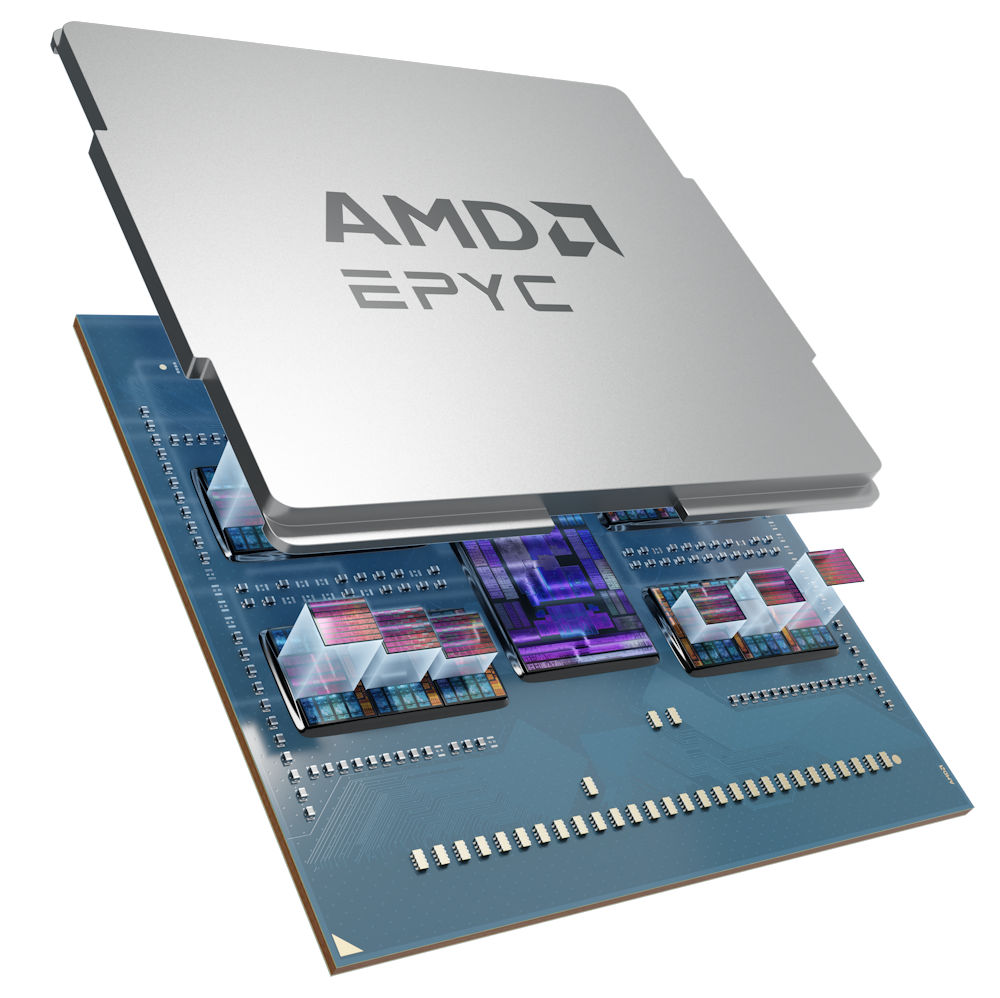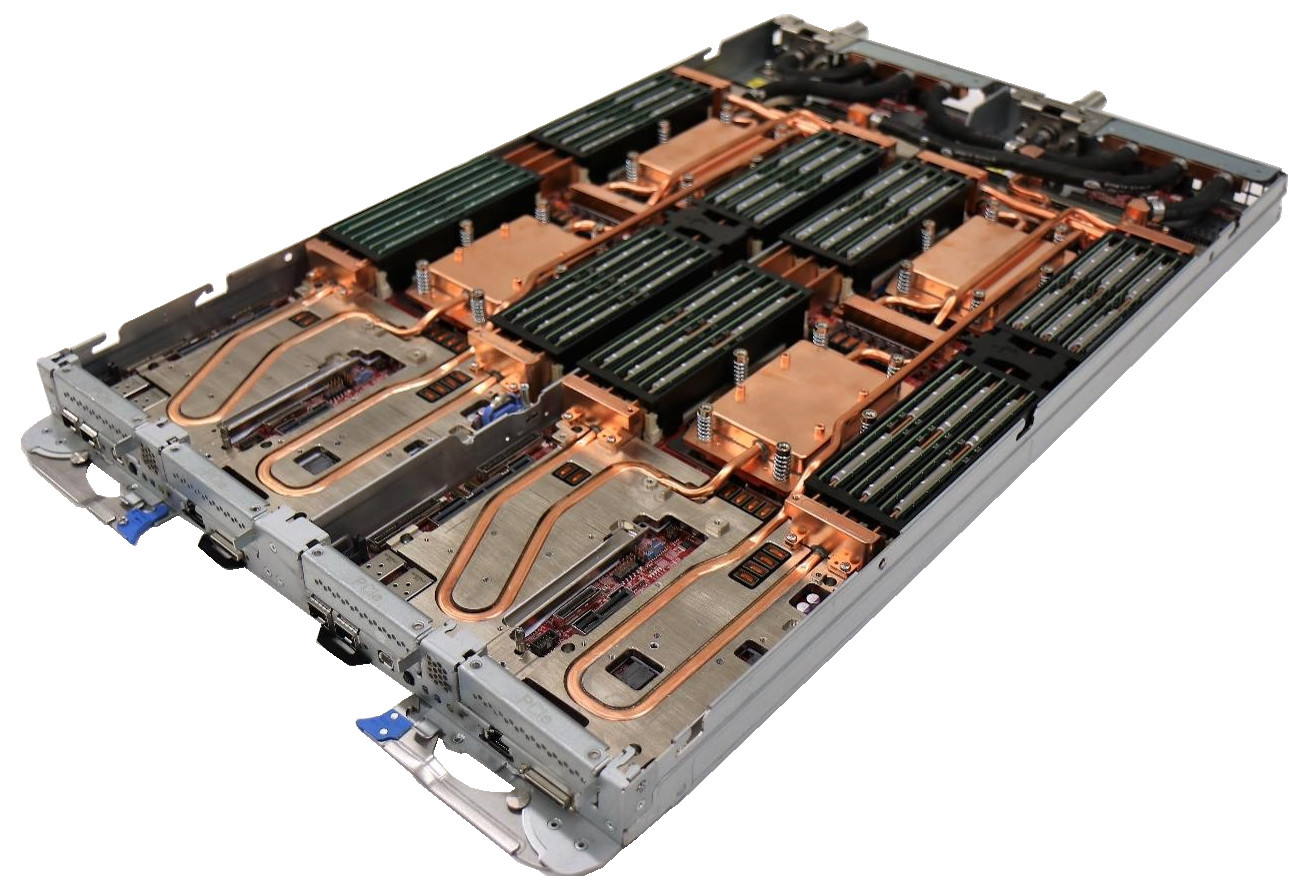Author
Updated
10 Jul 2023Form Number
LP1744PDF size
7 pages, 556 KBAbstract
Lenovo customers get breakthrough performance and energy efficiency with 4th Gen AMD EPYC™ processors featuring AMD 3D V-Cache™ technology.
Today, AMD has announced new processors in the 4th Gen AMD EPYC family; the AMD EPYC 9004 Series processors, Based on Zen 4c architecture (formerly codenamed "Bergamo") and the 4th Gen AMD EPYC processors with AMD 3D V-Cache Technology (formerly codenamed "Genoa-X". Lenovo plans to support these new high-performance processors in our new ThinkSystem V3 servers.
Change History
Changes in the July 10, 2023 update:
- Additional world record benchmark results - now 47 world records on ThinkSystem servers - World record benchmark results section
AMD processors
Today, AMD has announced new 4th Gen AMD EPYC™ processors:
- 4th Gen AMD EPYC processors based on Zen 4c architecture (formerly codenamed "Bergamo")
The newest iteration of 4th Gen AMD EPYC processors are optimized Zen 4c architecture. These processors have higher core counts, up to 128 cores, targeted at cloud native applications that are designed to exploit the scale, elasticity, resiliency, and flexibility of private & public clouds. The processors offer leadership x86 core density and energy efficiency while maintaining the proven, trusted Zen software compatibility.
- 4th Gen AMD EPYC processors with AMD 3D V-Cache Technology (formerly codenamed "Genoa-X")
Designed with up to 96 powerful Zen 4 cores and up to 1.15 GB of L3 cache, 4th Gen AMD EPYC processors with AMD 3D V-Cache technology deliver breakthrough performance on targeted technical computing workloads such as Electronic Design Automation (EDA), Computational Fluid Dynamics (CFD) and Finite Element Analysis (FEA) software and solutions. For many challenging workloads, having access to this large L3 cache enables improved performance by continuously feeding the processor with data without having to access main memory outside of the CPU, and empowering customers to realize faster time-to-results.

Figure 1. 4th Gen AMD EPYC processors with AMD 3D V-Cache Technology offer larger L3 cache, best suited for technical computing workloads
Processor features
The following table lists the features of the new AMD EPYC processors.
Key features of these processors:
- The processors with AMD 3D V-Cache have much larger L3 cache, up to 1150 MB
- The processors with Zen 4c architecture have higher core counts, up to 128 cores
† The maximum single-core frequency that the processor is capable of operating
ThinkSystem V3 servers
Lenovo plans to support these processors in our full portfolio of ThinkSystem V3 servers based on AMD EPYC processors. You can make configurations in Lenovo DCSC configurator.
- ThinkSystem SD665 V3 Neptune DWC Server (twin 2S water cooled nodes)
- ThinkSystem SD665-N V3 Neptune DWC Server (2S water cooled node with NVIDIA GPUs)
- ThinkSystem SR675 V3 (3U GPU-rich)
- ThinkSystem SR665 V3 (2U 2-socket) - support planned for July 2023
- ThinkSystem SR645 V3 (1U 2-socket) - support planned for July 2023
- ThinkSystem SR655 V3 (2U 1-socket) - support planned for July 2023
- ThinkSystem SR635 V3 (1U 1-socket) - support planned for July 2023

Figure 2. The Lenovo ThinkSystem SD665 V3 supports the new AMD processors
World record benchmark results
Lenovo has set 47 world records with the new AMD EPYC 9754 processor installed in ThinkSystem V3 servers. See our benchmark reports for details:
On the SR665 V3, our 2U2S server
- ThinkSystem SR665 V3 Sets 10 World Records with New SPECcpu Benchmark Result
- ThinkSystem SR665 V3 Sets 5 World Records with New SPECjbb Benchmark Result
- ThinkSystem SR665 V3 Sets 3 World Records with New SPECPower on Windows Benchmark Result
- ThinkSystem SR665 V3 Sets World Record with New SPECPower on Linux Benchmark Result
- ThinkSystem SR665 V3 Sets 2 World Records with New SPECompG Benchmark Result
On the SR645 V3, our 1U2S server
- ThinkSystem SR645 V3 Sets 2 World Records with New SPECPower on Windows Benchmark Result
- ThinkSystem SR645 V3 Sets World Record with New SPECPower on Linux Benchmark Result
On the SR655 V3, our 2U1S server:
- ThinkSystem SR655 V3 Sets 8 World Records with New SPECjbb Benchmark Results
- ThinkSystem SR655 V3 Sets 8 World Records with New SPECcpu Benchmark Results
- ThinkSystem SR655 V3 Sets 2 World Records with New SPECompG Benchmark Result
- ThinkSystem SR655 V3 Sets World Record with New SPECPower on Linux Benchmark Result
- ThinkSystem SR655 V3 Sets World Record with New SPECPower on Windows Benchmark Result
On the SR635 V3, our 1U1S server
For more information
For more information, see the following pages:
- Lenovo-AMD alliance landing page:
https://www.lenovo.com/us/en/servers-storage/alliance/amd/ - Lenovo DCSC configurator:
https://dcsc.lenovo.com
Trademarks
Lenovo and the Lenovo logo are trademarks or registered trademarks of Lenovo in the United States, other countries, or both. A current list of Lenovo trademarks is available on the Web at https://www.lenovo.com/us/en/legal/copytrade/.
The following terms are trademarks of Lenovo in the United States, other countries, or both:
Lenovo®
Neptune®
ThinkSystem®
The following terms are trademarks of other companies:
AMD, AMD 3D V-Cache™, and AMD EPYC™ are trademarks of Advanced Micro Devices, Inc.
Linux® is the trademark of Linus Torvalds in the U.S. and other countries.
Windows® is a trademark of Microsoft Corporation in the United States, other countries, or both.
SPECjbb® is a trademark of the Standard Performance Evaluation Corporation (SPEC).
Other company, product, or service names may be trademarks or service marks of others.
Configure and Buy
Full Change History
Changes in the July 10, 2023 update:
- Additional world record benchmark results - now 47 world records on ThinkSystem servers - World record benchmark results section
First published: June 13, 2023
Course Detail
Employees Only Content
The content in this document with a is only visible to employees who are logged in. Logon using your Lenovo ITcode and password via Lenovo single-signon (SSO).
The author of the document has determined that this content is classified as Lenovo Internal and should not be normally be made available to people who are not employees or contractors. This includes partners, customers, and competitors. The reasons may vary and you should reach out to the authors of the document for clarification, if needed. Be cautious about sharing this content with others as it may contain sensitive information.
Any visitor to the Lenovo Press web site who is not logged on will not be able to see this employee-only content. This content is excluded from search engine indexes and will not appear in any search results.
For all users, including logged-in employees, this employee-only content does not appear in the PDF version of this document.
This functionality is cookie based. The web site will normally remember your login state between browser sessions, however, if you clear cookies at the end of a session or work in an Incognito/Private browser window, then you will need to log in each time.
If you have any questions about this feature of the Lenovo Press web, please email David Watts at dwatts@lenovo.com.
